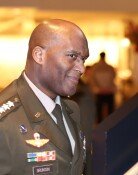Nuclear Issue Should Be Discussed at Upcoming Summit
Nuclear Issue Should Be Discussed at Upcoming Summit
Posted August. 10, 2007 05:46,
Experts and civic groups at home and abroad are saying in unison that the North Korean nuclear issue should be the main agenda of the second inter-Korean summit scheduled for August 28.
That is because the joint declaration for denuclearization was broken after North Korea tested its nuclear weapons in October 2006, although the leaders of the two Koreas declared they would independently strive to deepen the inter-Korean relationship in June 2000.
Gordon Flake, executive director of the Mansfield Foundation, said, As it always did, North Korea will likely avoid the pressing issues on the Korean Peninsula, including the nuclear issue, at the upcoming summit, adding, President Roh Moo-hyun should make sure that the denuclearization of the North is the main agenda of the talks. Otherwise, South Koreas role in the nuclear issue could be fundamentally undermined.
Professor Shi Yinghong of Renmin University in China said, North Korea considers the U.S. as its main counterpart regarding the nuclear issue, adding, The North Korean nuclear issue will not be the main agenda at the inter-Korean summit.
Hong Gwan-hee, director of Security Strategy Research Institute, said, President Roh should secure a firm commitment to dismantle the Norths nuclear program by discussing the North Korean nuclear issue before talking about inter-Korean economic cooperation.
The main opposition Grand National Party opposes backroom discussions of a peace declaration or peace treaty and is demanding progress toward the dismantlement of the North Korean nuclear program; tangible results regarding the repatriation of South Korean soldiers taken hostage during the Korean War and South Korean abductees, and an improvement in human rights conditions in the North.
Unification Minister Lee Jae-jeong said yesterday, The second inter-Korean talks will become an important turning point which will drive the resolution of the North Korean nuclear issue and the qualitative development of the inter-Korean relationship.
However, the South Korean government agreed to hold the summit without setting any agendas and has not made it clear that it will discuss the North Korean nuclear issue.
Former Prime Minister Lee Hae-chan participated in behind-the-scene efforts to make the summit happen by visiting the North. Lee attended the ruling Uri Partys Northeast Asia Peace Committee meeting yesterday and said that he proposed President Roh discuss establishing a regular inter-Korean summit, establishing arms reduction talks, setting up an inter-Korean liaison organ, the peaceful use of DMZ, addressing the problem of families separated during the Korean War, and confirming Korean soldiers killed in the Korean War. The North Korean nuclear issue, however, was not mentioned.
In particular, North Korea has made it clear that the nuclear issue is a security issue between it and the U.S., refusing to recognize it as an agenda for inter-Korean talks. In this regard, some raise concerns that the North could refuse to take on the nuclear issue as an official agenda at the upcoming talks.
For seven years since the first inter-Korean summit, the North has stuck to the principle that security issues, including the nuclear issue, are bilateral issues with the U.S. Meanwhile, it pursued its own interests through economic cooperation with the South.
Under these circumstances, many point out that it would be hard to reach a substantive consensus on the nuclear issue in the upcoming summit, even if the leaders discuss the issue.






![“잠만 자면 입이 바싹바싹”…잠들기 전에 이것 체크해야 [알쓸톡]](https://dimg.donga.com/c/138/175/90/1/wps/NEWS/IMAGE/2026/02/23/133404749.3.jpg)
